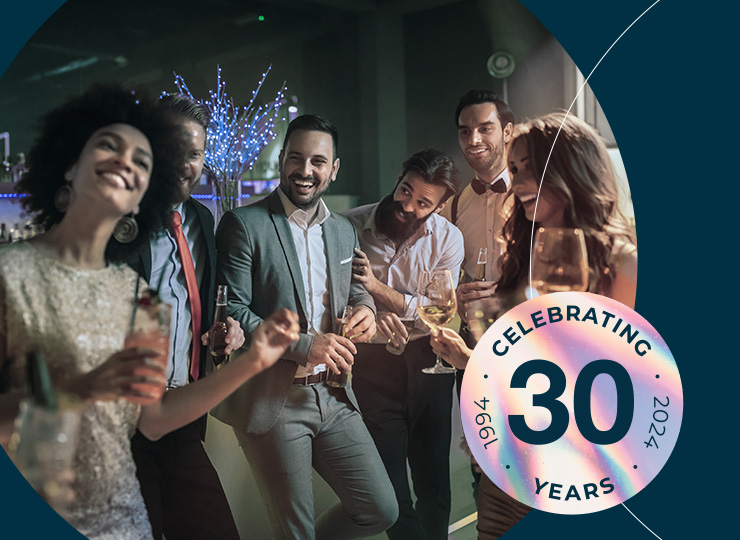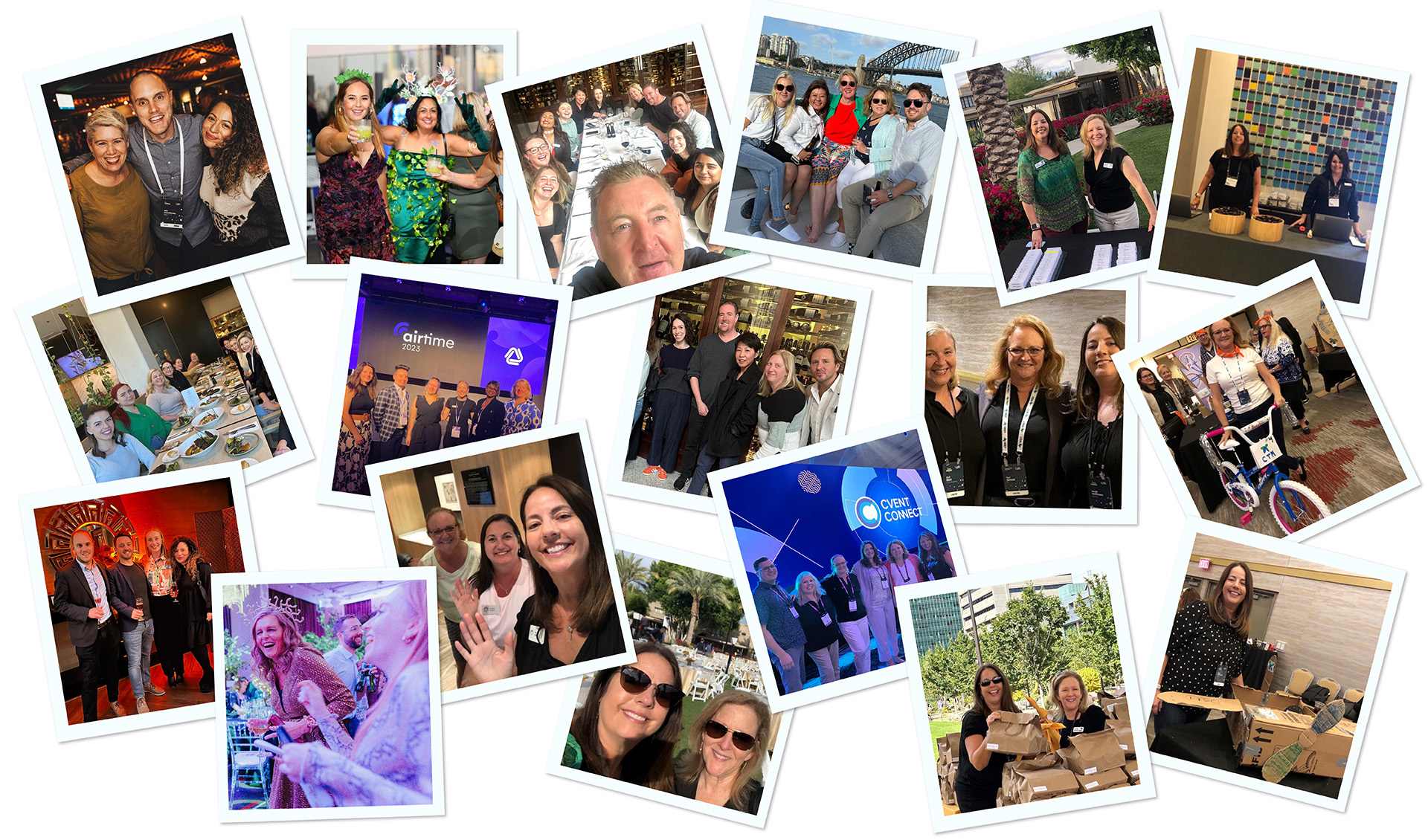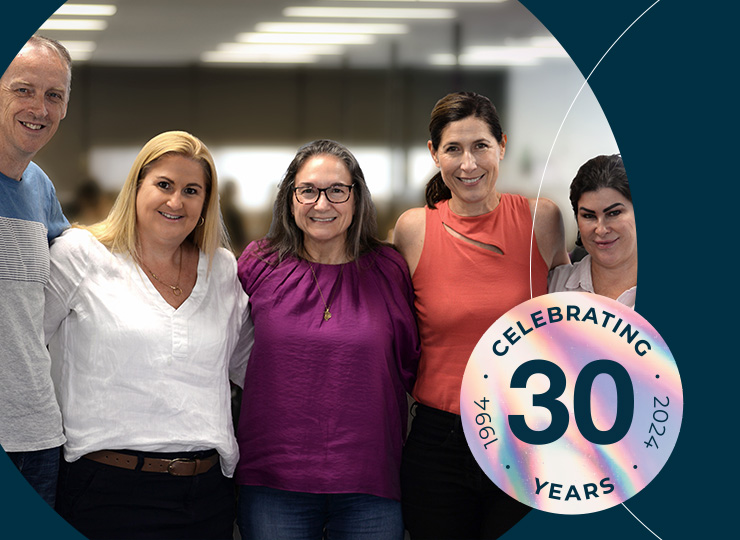

The evolution of corporate meetings and events
For those of us with a few extra years under our belts, the memories of the ‘90s corporate meetings and events era are undoubtedly etched in our memories. We strutted into hotel ballrooms confronted by a sea of power suits and hairspray, exchanged business cards, listened to keynote speakers, and indulged in a decadent spread of cocktail sausages and mini quiches.
There were no online registrations, no QR codes, no live polls and certainly no live streaming. Clipboards, flip charts, white-out and highlighters were an Event Planner’s best friend.
As Corporate Travel Management (CTM) turns 30, we reflect on the past three decades of corporate meetings and events. While certain types of events, such as conferences, product launches and sales incentives, have maintained a constant presence in the corporate events calendar, the methods we employ to strategize, execute, and engage with these gatherings have transformed beyond recognition.
To help us navigate this journey through time, we spoke with some of our events industry experts at CTM Meetings & Events (CTM M&E): Tami Reier – SVP/General Manager, North America; Marla Everett – Director, Consulting Solutions, North America; Tracey Edwards – Global Strategic Lead and General Manager AU/NZ; Mike Leeson – General Manager, Europe, and Teri Awwad, Executive Director of Event Operations, who have witnessed these transformations firsthand.
The timeless purpose of business events
In a world of ever-evolving trends and technologies, it’s remarkable to see that the core reasons for hosting business events have remained relatively unchanged for 30 years; bringing people together, nurturing relationships, building knowledge, and fostering a sense of community.
“A lot of the core verticals and event types we see today are the same as they were 30 years ago,” Reier points out. “It’s the process and content that have evolved.”

“30 years ago, people attended events with the primary intention of being educated and making connections – there was no access to the internet or readily available information even 20 years ago, so events were largely a platform for learning,” Edwards adds.
Everett reflects, “Creating memorable experiences has always played a pivotal role in retaining employees, strengthening a company’s culture, and building influential relationships, and this has never been more important than in today’s geographically dispersed workplace and global economy.”
The global pandemic has underscored the intrinsic need for human connection, and the post-pandemic landscape emphasizes both the emotional and business objectives underpinning corporate events. “I think after the pandemic, businesses have come back to realize the priceless value of emotional connection, of just being together, but now there is more of a balance between meeting corporate objectives while also creating memorable experiences for attendees,” says Everett.

From fax machines to digital platforms and mobile technology
Reier recalls the time when technology barely scratched the surface of the meeting and events industry. “There was no event registration technology 30 years ago, just a telephone and the fax machine. The concept of online registration was yet to be conceived, and Event Managers relied on Excel or Word to compile long lists of registration details.
Once Event Managers had their list of attendees compiled, it was time to put that Excel spreadsheet into action, handing it over to a Travel Consultant. In a world starved of automation and digital technology, the Travel Consultant would manually book every individual’s flight and accommodation, issue a paper airline ticket, and send them via snail-mail to each attendee along with a collection of paper collateral, tickets, travel itinerary, event agenda, FAQs and more. Everything was printed; corporate social responsibility (CSR) was yet to make the event agenda.
“We even created “leave it at home cards” for attendees to place on their refrigerators, which outlined the hotel/s they were staying at and phone numbers if a family member needed to contact an attendee whilst away. No mobile phones back then,” Reier says.
Edwards adds, “Secure payment gateways were non-existent, so for customers to make a payment, it involved us phoning them on a landline, taking their details down, and then processing payment manually.”

Communication challenges of the past
Event communication was a world away from today’s seamless, convenient experience. In an era preceding mobile phones, event organizers relied on walkie-talkies or two-way radios, adding complexity to technical setup and communication protocols.
Everett notes, “You had to arrive onsite extremely early to ensure everyone was issued the correct walkie-talkie, and they were all switched to the right channel.” Then came the introduction of company-issued mobile/cell phones, allocated to staff for event management purposes only. Reier reminisces, “No one had their own mobile/cell phone back then, so having access to a company-issued flip phone was pretty cool.” A register was maintained, listing all associated mobile/cell phone numbers and their allocated Event Manager. However, these phones did not have international capabilities, so hotel landlines remained the lifeline for international communication during events.

The event registration desk itself required extensive IT set-up, with a landline phone, printer, and photocopier, all connected to a computer.
Edwards, Reier and Everett all agree on the transformative power that technology and automation have delivered to the business event experience. From registration processes to inbound and outbound communication, technology has made the entire event planning journey seamless and efficient. The hours once spent on manual processes, susceptible to inaccuracies and last-minute changes, have been significantly reduced.
Digital transformation in event planning
As we entered the 21st century, the objectives of meetings and events began to evolve.
Technological advancements brought about a transformation in how we plan and communicate, with digital platforms used to manage contracts, run sheets, menus, flight and room allocations, personalized event agendas, and much more. “Being able to make quick changes to agendas, or run polls, surveys, and event gamification has been a real game-changer,” says Edwards.
In the early 2000s, laptops made their grand entrance into the world of event planning. “We really thought we’d hit the big time”, reminisces Reier. Leveraging their new “mobile computer”, the laptop gave Event Managers the freedom to move onsite, one significant step closer to the freedoms and efficiencies enjoyed with today’s web-enabled mobile device and event app.
The transition from the era of paper and manual processes to the digital age of laptops and mobile phones enabled more efficient event management, streamlined communication, and quicker adaptability to changing circumstances. “We no longer need to carry around kilos of paperwork. We just need our mobile phone to implement a change, and push out personalized, targeted communication to impacted event attendees,” Edwards shares.

The rise of the attendee experience
Reier emphasises the evolution from planning events based on the desires of meeting owners or company executives to a more attendee-centric approach. “We now focus on the attendee experience,” she states. “Recognizing that attendees are at the heart of the event’s success, this approach ensures that they learn, feel recognized, and ultimately drive ROI for the business.”
Everett delves into the shift in corporate events experiences. “Wellness is the new “golf”. In the past, Event Managers often sought accommodations with golf courses onsite. But now, the focus has shifted towards fostering holistic well-being. Attendees now seek to participate in a morning yoga session, a meditation experience on the beach, or more intimate breakout rooms away from the hustle and bustle of ballrooms and formal conference seating.”
Refillable water stations, health-centric speaker content, and team-building activities that give back to local communities have become staples of the modern-day business event, reflecting a heightened commitment to sustainability and CSR. Attendees are now particular about the quality of the products and services they encounter, and the impact of the activities they partake in.
Reier acknowledges that sustainability takes on different forms for different companies and individuals; from eliminating single-use water bottles, rethinking promotional gifts and giveaways, and introducing water stations to reduce the carbon footprint.

The evolution of the Event Manager
Reier explains the monumental shift in the role of Event Managers. “We used to be in the game of logistics,” reflecting on the more administrative and operational nature of the job. “However, today’s Event Managers operate at a much higher strategic level. They are no longer just organizers but are responsible for handling advanced technologies, contract negotiations, and ensuring duty of care for event attendees,” she says. Many responsibilities that once resided in specialized roles have now converged into the domain of Event Managers, demanding a more profound understanding of technology, legal intricacies, and the welfare of attendees.

“The one thing that hasn’t changed in the event planning process is the focus on details, the logistics, and the extensive behind-the-scenes coordination and planning. Our primary job is to ensure we are taking care of all those intricate, fast-changing details, so the attendee experience is second to none, “says Edwards.
The value of experience and adaptability
Everett draws attention to the invaluable experience that CTM M&E brings to the table. “We have a team of experience,” she says. “This experience is not only about planning successful events but about learning from the unexpected and evolving with the industry. It’s the kind of knowledge that can’t be taught or learned from a textbook.”
She reflects on how contracts used to be as simple as a hotel agreeing to supply rooms, often with agreements jotted down on the back of a napkin. However, the events and travel industry now demand a comprehensive understanding of formal, legally binding contracts and complex negotiations.

Awwad recalls a customer who had extensive staffing challenges within their meetings and events team, which created a huge challenge for them to deliver four events in one month as well as a large conference that included multiple ancillary events. “We took the reins and designed a structure to plan, collaborate and execute them all. And, amongst the planning, we even created event management standard operating procedures for the customer’s future meeting processes and standards. To say they were thankful was an understatement.”
Awwad goes on to share another story where a hurricane was brewing at sea and set to hit an event location where they were running an annual global conference. The CTM M&E team worked around the clock to track attendees and manage room inventory. Additional event spaces were shifted after the storm to avoid water-damaged areas and where speakers could not make the trip, the agenda content for sessions was adjusted to still bring high value messages to event attendees.
In organizing an Australian event for 3,500 attendees from across 14 countries, Edwards recalls, “We had to close roads and control traffic lights; it was madness. But, to see all those people in one location and knowing you and your team were successful in creating the experience, is an event I will never forget.”
From helicoptering in supplies and people to the top of a glacier to delivering five events in a month with short notice; to navigating major on-site event changes because of a hurricane; to arranging road closures to facilitate mass movements, the CTM M&E team has accumulated a wealth of unique event management experience in their 30+ years.
Looking ahead
As we reflect on 30 years of meetings and events management at CTM, the landscape continues to evolve, and the future holds exciting possibilities. With the rapid advancement of technology, customers can expect AI-powered experiences to become an integral part of their business events. Sustainability and eco-conscious practices are expected to be at the forefront of the industry, as well as enhanced personalization and data-driven insights to create tailored experiences for attendees.
The demand for meetings and events continues to climb. “I don’t foresee that pace slowing anytime soon, with companies understanding that there is clear value in, in-person connection and collaboration,” says Reier. With many companies reducing their office real estate and more people working remotely, there will continue to be a strong appetite to connect employees via events.
CTM M&E’s journey, from its humble beginnings as an Australian event management company to a global events specialist operating across four continents, mirrors this transformation, emphasizing the adaptability and resilience required in the ever-changing world of event planning. With this evolution, the future holds exciting prospects for Event Managers and their corporate customers, as they continue to shape the meetings and event experience one strategic move at a time.

Secure the success of your meetings and events with seasoned event management professionals.
Reach out to CTM Meetings & Events today and ensure your event’s excellence.




